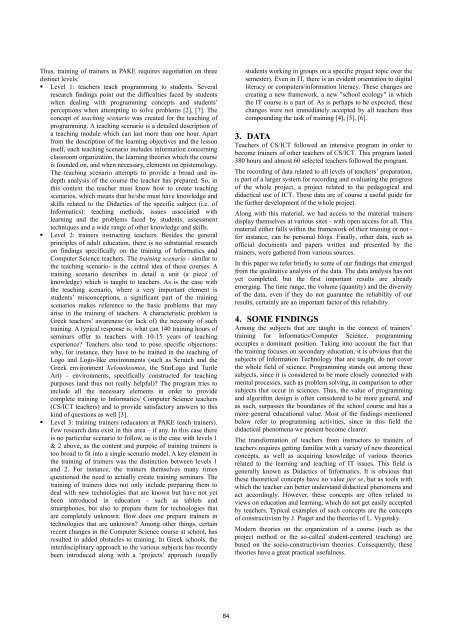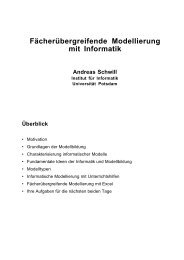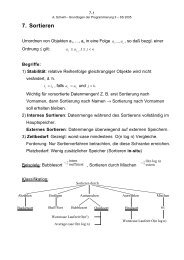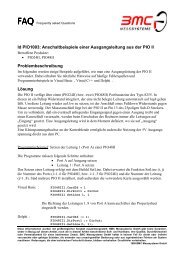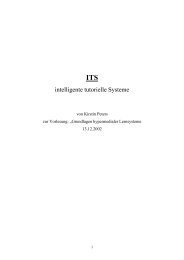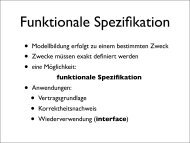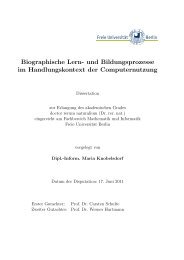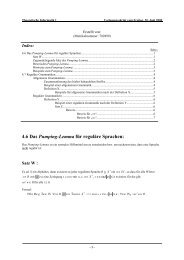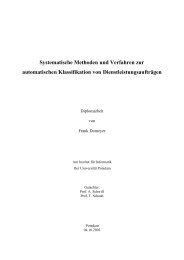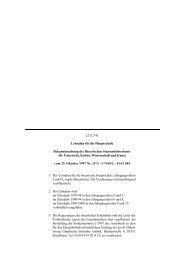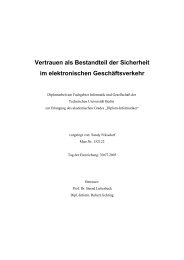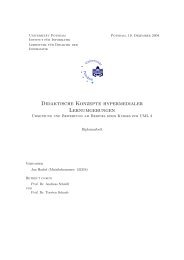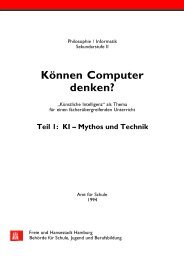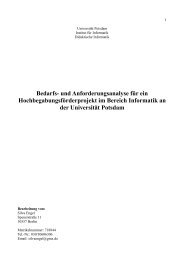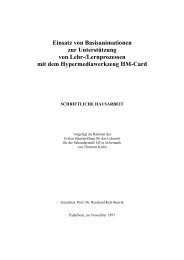Maria Knobelsdorf, University of Dortmund, Germany - Didaktik der ...
Maria Knobelsdorf, University of Dortmund, Germany - Didaktik der ...
Maria Knobelsdorf, University of Dortmund, Germany - Didaktik der ...
You also want an ePaper? Increase the reach of your titles
YUMPU automatically turns print PDFs into web optimized ePapers that Google loves.
Thus, training <strong>of</strong> trainers in PAKE requires negotiation on three<br />
distinct levels:<br />
� Level 1: teachers teach programming to students. Several<br />
research findings point out the difficulties faced by students<br />
when dealing with programming concepts and students’<br />
perceptions when attempting to solve problems [2], [7]. The<br />
concept <strong>of</strong> teaching scenario was created for the teaching <strong>of</strong><br />
programming. A teaching scenario is a detailed description <strong>of</strong><br />
a teaching module which can last more than one hour. Apart<br />
from the description <strong>of</strong> the learning objectives and the lesson<br />
itself, each teaching scenario includes information concerning<br />
classroom organization, the learning theories which the course<br />
is founded on, and when necessary, elements on epistemology.<br />
The teaching scenario attempts to provide a broad and indepth<br />
analysis <strong>of</strong> the course the teacher has prepared. So, in<br />
this context the teacher must know how to create teaching<br />
scenarios, which means that he/she must have knowledge and<br />
skills related to the Didactics <strong>of</strong> the specific subject (i.e. <strong>of</strong><br />
Informatics): teaching methods, issues associated with<br />
learning and the problems faced by students, assessment<br />
techniques and a wide range <strong>of</strong> other knowledge and skills.<br />
� Level 2: trainers instructing teachers. Besides the general<br />
principles <strong>of</strong> adult education, there is no substantial research<br />
on findings specifically on the training <strong>of</strong> Informatics and<br />
Computer Science teachers. The training scenario - similar to<br />
the teaching scenario- is the central idea <strong>of</strong> these courses. A<br />
training scenario describes in detail a unit (a piece <strong>of</strong><br />
knowledge) which is taught to teachers. As is the case with<br />
the teaching scenario, where a very important element is<br />
students’ misconceptions, a significant part <strong>of</strong> the training<br />
scenarios makes reference to the basic problems that may<br />
arise in the training <strong>of</strong> teachers. A characteristic problem is<br />
Greek teachers’ awareness (or lack <strong>of</strong>) the necessity <strong>of</strong> such<br />
training. A typical response is: what can 140 training hours <strong>of</strong><br />
seminars <strong>of</strong>fer to teachers with 10-15 years <strong>of</strong> teaching<br />
experience? Teachers also tend to pose specific objections:<br />
why, for instance, they have to be trained in the teaching <strong>of</strong><br />
Logo and Logo-like environments (such as Scratch and the<br />
Greek environment Xelonokosmos, the StarLogo and Turtle<br />
Art) – environments, specifically constructed for teaching<br />
purposes (and thus not really helpful)? The program tries to<br />
include all the necessary elements in or<strong>der</strong> to provide<br />
complete training to Informatics/ Computer Science teachers<br />
(CS/ICT teachers) and to provide satisfactory answers to this<br />
kind <strong>of</strong> questions as well [3].<br />
� Level 3: training trainers (educators at PAKE teach trainers).<br />
Few research data exist in this area – if any. In this case there<br />
is no particular scenario to follow, as is the case with levels 1<br />
& 2 above, as the content and purpose <strong>of</strong> training trainers is<br />
too broad to fit into a single scenario model. A key element in<br />
the training <strong>of</strong> trainers was the distinction between levels 1<br />
and 2. For instance, the trainers themselves many times<br />
questioned the need to actually create training seminars. The<br />
training <strong>of</strong> trainers does not only include preparing them to<br />
deal with new technologies that are known but have not yet<br />
been introduced in education - such as tablets and<br />
smartphones, but also to prepare them for technologies that<br />
are completely unknown. How does one prepare trainers in<br />
technologies that are unknown? Among other things, certain<br />
recent changes in the Computer Science course at school, has<br />
resulted in added obstacles to training. In Greek schools, the<br />
interdisciplinary approach to the various subjects has recently<br />
been introduced along with a ‘projects’ approach (usually<br />
84<br />
students working in groups on a specific project topic over the<br />
semester). Even in IT, there is an evident orientation to digital<br />
literacy or computers/information literacy. These changes are<br />
creating a new framework, a new "school ecology" in which<br />
the IT course is a part <strong>of</strong>. As is perhaps to be expected, these<br />
changes were not immediately accepted by all teachers thus<br />
compounding the task <strong>of</strong> training [4], [5], [6].<br />
3. DATA<br />
Teachers <strong>of</strong> CS/ICT followed an intensive program in or<strong>der</strong> to<br />
become trainers <strong>of</strong> other teachers <strong>of</strong> CS/ICT. This program lasted<br />
380 hours and almost 60 selected teachers followed the program.<br />
The recording <strong>of</strong> data related to all levels <strong>of</strong> teachers’ preparation,<br />
is part <strong>of</strong> a larger system for recording and evaluating the progress<br />
<strong>of</strong> the whole project, a project related to the pedagogical and<br />
didactical use <strong>of</strong> ICT. These data are <strong>of</strong> course a useful guide for<br />
the further development <strong>of</strong> the whole project.<br />
Along with this material, we had access to the material trainers<br />
display themselves at various sites - with open access for all. This<br />
material either falls within the framework <strong>of</strong> their training or not -<br />
for instance, can be personal blogs. Finally, other data, such as<br />
<strong>of</strong>ficial documents and papers written and presented by the<br />
trainers, were gathered from various sources.<br />
In this paper we refer briefly to some <strong>of</strong> our findings that emerged<br />
from the qualitative analysis <strong>of</strong> the data. The data analysis has not<br />
yet completed, but the first important results are already<br />
emerging. The time range, the volume (quantity) and the diversity<br />
<strong>of</strong> the data, even if they do not guarantee the reliability <strong>of</strong> our<br />
results, certainly are an important factor <strong>of</strong> this reliability.<br />
4. SOME FINDINGS<br />
Among the subjects that are taught in the context <strong>of</strong> trainers’<br />
training for Informatics/Computer Science, programming<br />
occupies a dominant position. Taking into account the fact that<br />
the training focuses on secondary education, it is obvious that the<br />
subjects <strong>of</strong> Information Technology that are taught, do not cover<br />
the whole field <strong>of</strong> science. Programming stands out among these<br />
subjects, since it is consi<strong>der</strong>ed to be more closely connected with<br />
mental processes, such as problem solving, in comparison to other<br />
subjects that occur in sciences. Thus, the value <strong>of</strong> programming<br />
and algorithm design is <strong>of</strong>ten consi<strong>der</strong>ed to be more general, and<br />
as such, surpasses the boundaries <strong>of</strong> the school course and has a<br />
more general educational value. Most <strong>of</strong> the findings mentioned<br />
below refer to programming activities, since in this field the<br />
didactical phenomena we present become clearer.<br />
The transformation <strong>of</strong> teachers from instructors to trainers <strong>of</strong><br />
teachers requires getting familiar with a variety <strong>of</strong> new theoretical<br />
concepts, as well as acquiring knowledge <strong>of</strong> various theories<br />
related to the learning and teaching <strong>of</strong> IT issues. This field is<br />
generally known as Didactics <strong>of</strong> Informatics. It is obvious that<br />
these theoretical concepts have no value per se, but as tools with<br />
which the teacher can better un<strong>der</strong>stand didactical phenomena and<br />
act accordingly. However, these concepts are <strong>of</strong>ten related to<br />
views on education and learning, which do not get easily accepted<br />
by teachers. Typical examples <strong>of</strong> such concepts are the concepts<br />
<strong>of</strong> constructivism by J. Piaget and the theories <strong>of</strong> L. Vygotsky.<br />
Mo<strong>der</strong>n theories on the organization <strong>of</strong> a course (such as the<br />
project method or the so-called student-centered teaching) are<br />
based on the socio-constructivism theories. Consequently, these<br />
theories have a great practical usefulness.


